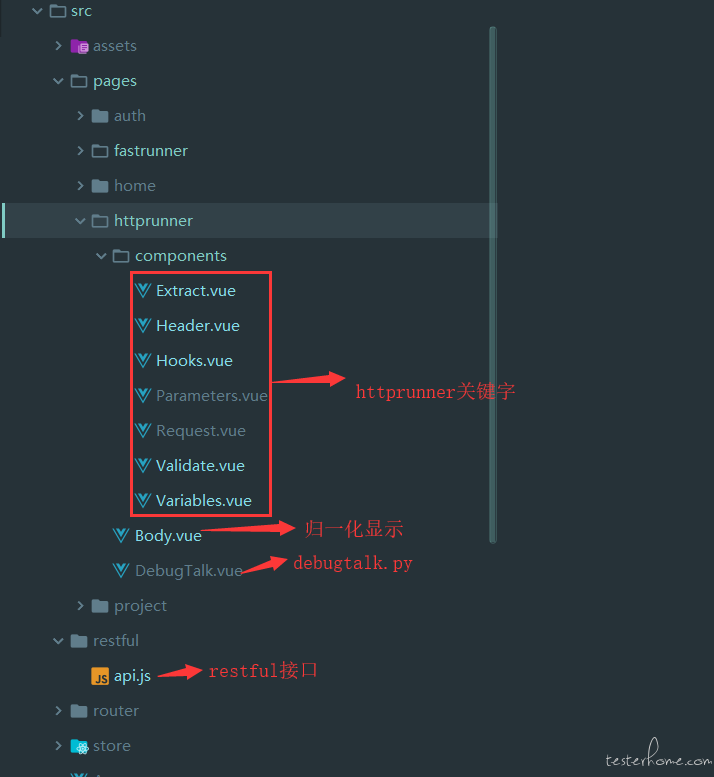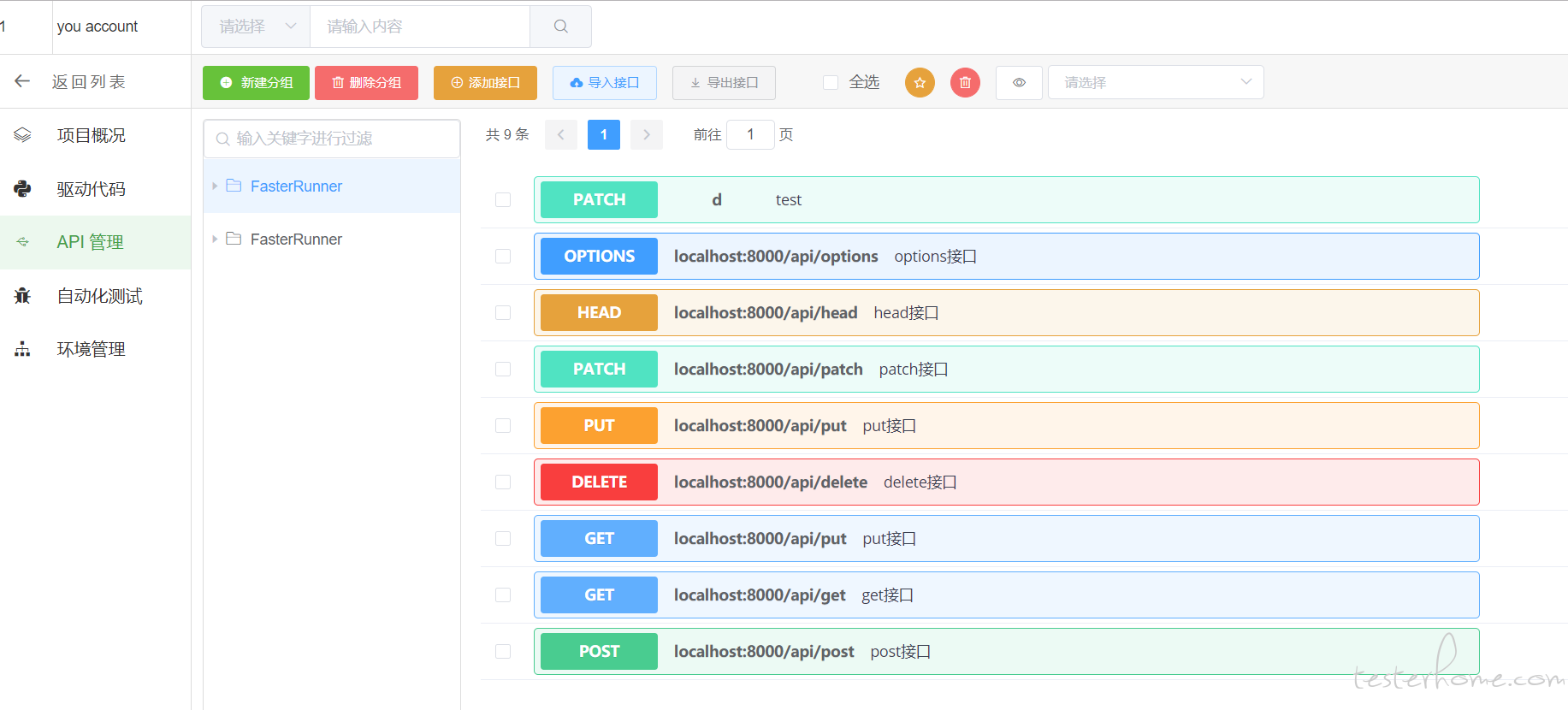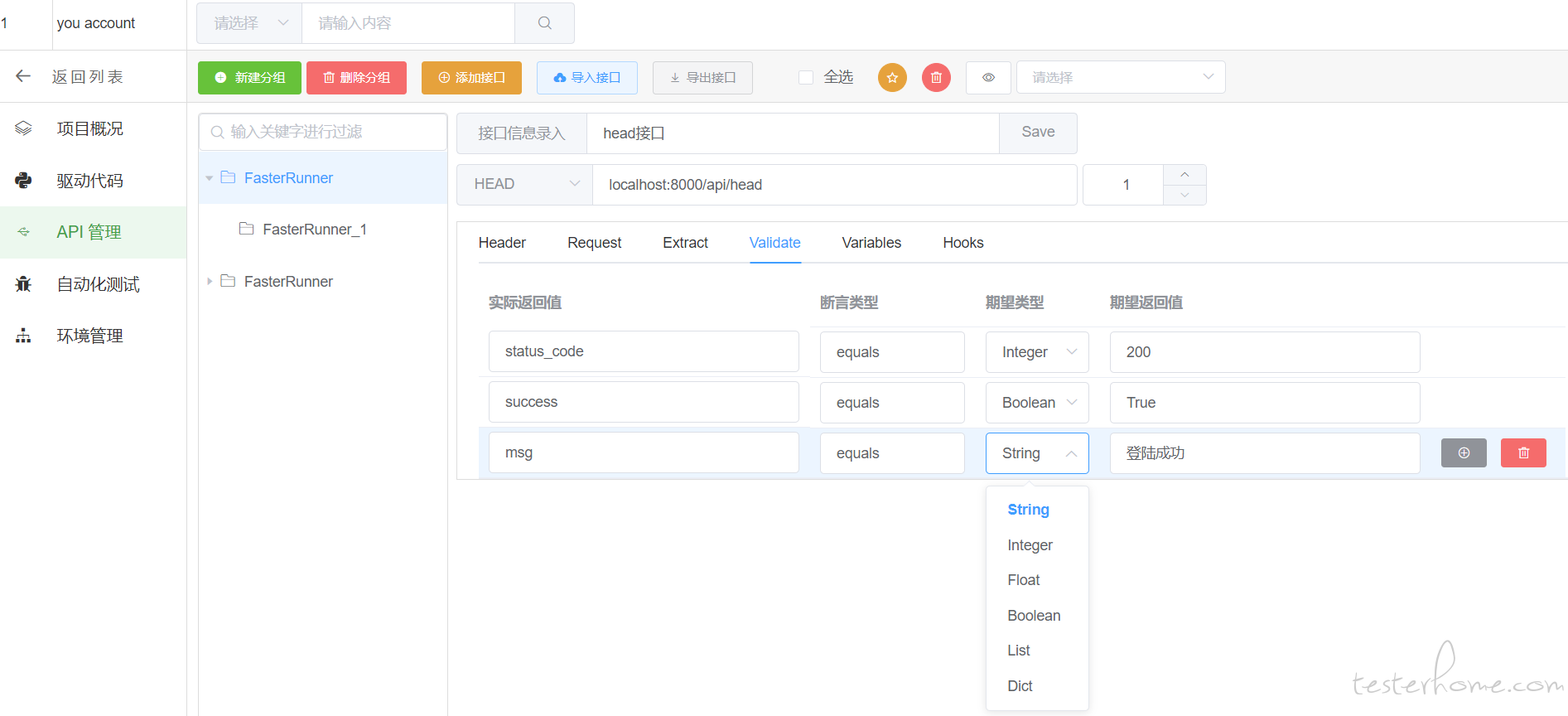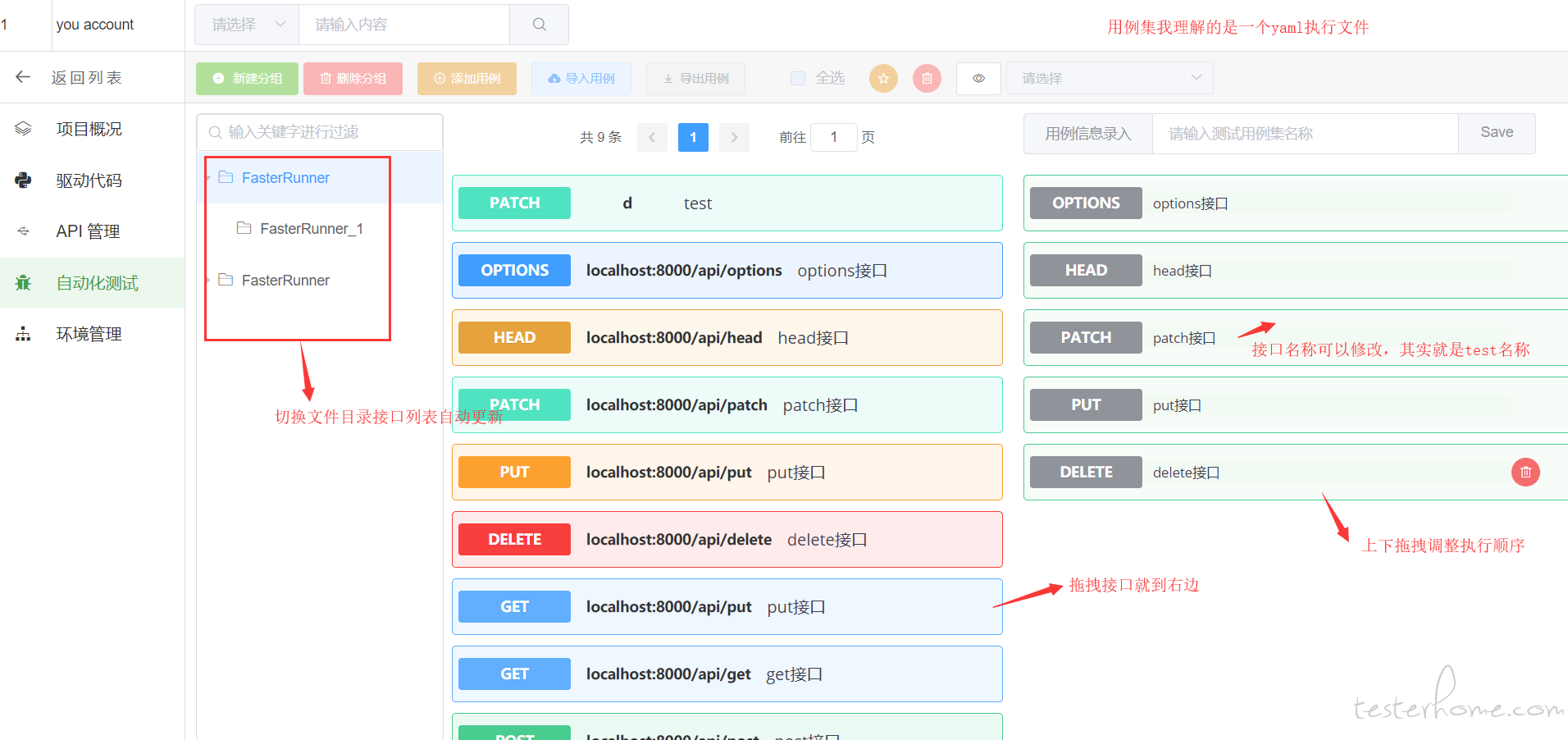
之前已经在社区开源过 HttpRunnerManager,由于之前设计过于简单,导致后面功能扩展带来了很大局限性,HttpRunner 很多特性也不能很好的完全实现,本人是@debugtalk的忠实粉丝,一直都在探索 HttpRunner 最佳体现形式,结合自己使用 HttpRunner 的实践和痛点,这次给大家带来了一款小而美的测试工具,目前雏形已经完成,计划后续开源在社区,提前发表出来也是希望使用 HttpRunner 的童鞋们多多给提提需求
本次采用前后端分离方式,后端还是采用了自己最熟悉的 django 开发,结合 django_restful 提供 restful 接口, 前端采用了目前比较热的 vue.js + element-ui
其中 restful 管理所有前后端交互的接口,pages 里对于 HttpRunner 的所有关键字都采用组件形式进行模块化封装,如下所示:

后端还是采用了 MVT 模式,没有特意进行文件夹划分,所有数据表放置在 models.py 所有类视图在 views.py, 其他操作都置于 utils 包下
后端数据结构及解析类:
class Format(object):
"""
解析标准HttpRunner脚本 前端->后端
"""
def __init__(self, body):
"""
body => {
header: header -> [{key:'', value:'', desc:''},],
request: request -> {
form: formData - > [{key: '', value: '', type: 1, desc: ''},],
json: jsonData -> {},
params: paramsData -> [{key: '', value: '', type: 1, desc: ''},]
files: files -> {"fields","binary"}
},
extract: extract -> [{key:'', value:'', desc:''}],
validate: validate -> [{expect: '', actual: '', comparator: 'equals', type: 1},],
variables: variables -> [{key: '', value: '', type: 1, desc: ''},],
hooks: hooks -> [{setup: '', teardown: ''},],
url: url -> string
method: method -> string
name: name -> string
}
"""
try:
self.name = body.pop('name')
self.url = body.pop('url')
self.method = body.pop('method')
self.times = body.pop('times')
self.headers = body['header'].pop('header')
self.params = body['request']['params'].pop('params')
self.data = body['request']['form'].pop('data')
self.json = body['request'].pop('json')
self.files = body['request']['files'].pop('files')
self.variables = body['variables'].pop('variables')
self.extract = body['extract'].pop('extract')
self.validate = body.pop('validate').pop('validate')
self.setup_hooks = body['hooks'].pop('setup_hooks')
self.teardown_hooks = body['hooks'].pop('teardown_hooks')
self.desc = {
"header": body['header'].pop('desc'),
"data": body['request']['form'].pop('desc'),
"files": body['request']['files'].pop('desc'),
"params": body['request']['params'].pop('desc'),
"extract": body['extract'].pop('desc'),
"variables": body['variables'].pop('desc'),
}
self.relation = body.pop('nodeId')
self.project = body.pop('project')
self.testcase = None
except KeyError:
pass
def parse_test(self):
"""
返回标准化HttpRunner "desc" 字段运行需去除
"""
test = {
"name": self.name,
"times": self.times,
"request": {
"url": self.url,
"method": self.method
},
"desc": self.desc
}
if self.headers:
test["request"]["headers"] = self.headers
if self.params:
test["request"]["params"] = self.params
if self.data:
test["request"]["data"] = self.data
if self.json:
test["request"]["json"] = self.json
if self.files:
test["request"]["files"] = self.files
if self.extract:
test["extract"] = self.extract
if self.validate:
test['validate'] = self.validate
if self.variables:
test["variables"] = self.variables
if self.setup_hooks:
test['setup_hooks'] = self.setup_hooks
if self.teardown_hooks:
test['teardown_hooks'] = self.teardown_hooks
self.testcase = test
前端数据解析类:
class Parse(object):
"""
标准HttpRunner脚本解析至前端 后端->前端
"""
def __init__(self, body):
"""
body: =>{
"name": "get token with $user_agent, $os_platform, $app_version",
"request": {
"url": "/api/get-token",
"method": "POST",
"headers": {
"app_version": "$app_version",
"os_platform": "$os_platform",
"user_agent": "$user_agent"
},
"json": {
"sign": "${get_sign($user_agent, $device_sn, $os_platform, $app_version)}"
},
"extract": [
{"token": "content.token"}
],
"validate": [
{"eq": ["status_code", 200]},
{"eq": ["headers.Content-Type", "application/json"]},
{"eq": ["content.success", true]}
],
"setup_hooks": [],
"teardown_hooks": []
}
"""
self.name = body.get('name', '')
self.times = body.get('times', 1) # 如果导入没有times 默认为1
self.request = body.get('request') # header files params json data
self.variables = body.get('variables')
self.extract = body.get('extract')
self.validate = body.get('validate')
self.setup_hooks = body.get('setup_hooks', [])
self.teardown_hooks = body.get('teardown_hooks', [])
self.desc = body.get('desc')
self.testcase = None
@staticmethod
def __get_type(content):
"""
返回data_type 默认string
"""
var_type = {
"str": 1,
"int": 2,
"float": 3,
"bool": 4,
"list": 5,
"dict": 6,
}
key = str(type(content).__name__)
if key in ["list", "dict"]:
content = json.dumps(content)
else:
content = str(content)
return var_type[key], content
def parse_http(self):
"""
标准前端脚本格式
"""
init = {
"key": "",
"value": "",
"desc": ""
}
init_p = {
"key": "",
"value": "",
"desc": "",
"type": 1
}
# 初始化test结构
test = {
"name": self.name,
"times": self.times,
"url": self.request['url'],
"method": self.request['method'],
"header": [init],
"request": {
"data": [init_p],
"params": [init_p],
"json_data": ''
},
"validate": [{
"expect": "",
"actual": "",
"comparator": "equals",
"type": 1
}],
"variables": [init_p],
"extract": [init],
"hooks": [{
"setup": "",
"teardown": ""
}]
}
if self.request.get('headers'):
test["header"] = []
for key, value in self.request.pop('headers').items():
test['header'].append({
"key": key,
"value": value,
"desc": self.desc["header"][key]
})
if self.request.get('data'):
test["request"]["data"] = []
for key, value in self.request.pop('data').items():
obj = Parse.__get_type(value)
test['request']['data'].append({
"key": key,
"value": obj[1],
"type": obj[0],
"desc": self.desc["data"][key]
})
if self.request.get('params'):
test["request"]["params"] = []
for key, value in self.request.pop('params').items():
test['request']['params'].append({
"key": key,
"value": value,
"type": 1,
"desc": self.desc["params"][key]
})
if self.request.get('json'):
test["request"]["json_data"] = \
json.dumps(self.request.pop("json"), indent=4,
separators=(',', ': '), ensure_ascii=False)
if self.extract:
test["extract"] = []
for content in self.extract:
for key, value in content.items():
test['extract'].append({
"key": key,
"value": value,
"desc": self.desc["extract"][key]
})
if self.variables:
test["variables"] = []
for content in self.variables:
for key, value in content.items():
obj = Parse.__get_type(value)
test["variables"].append({
"key": key,
"value": obj[1],
"desc": self.desc["variables"][key],
"type": obj[0]
})
if self.validate:
test["validate"] = []
for content in self.validate:
for key, value in content.items():
obj = Parse.__get_type(value[1])
test["validate"].append({
"expect": obj[1],
"actual": value[0],
"comparator": key,
"type": obj[0]
})
if self.setup_hooks or self.teardown_hooks:
test["hooks"] = []
if len(self.setup_hooks) > len(self.teardown_hooks):
for index in range(0, len(self.setup_hooks)):
teardown = ""
if index < len(self.teardown_hooks):
teardown = self.teardown_hooks[index]
test["hooks"].append({
"setup": self.setup_hooks[index],
"teardown": teardown
})
else:
for index in range(0, len(self.teardown_hooks)):
setup = ""
if index < len(self.setup_hooks):
setup = self.setup_hooks[index]
test["hooks"].append({
"setup": setup,
"teardown": self.teardown_hooks[index]
})
self.testcase = test











还没开始做呢!
以上就是目前完成的部分内容,核心就是先录入 api(实质是 test 结构),然后可以拖拽 api 组成用例集,httprunner 分为 testcase-api-suite,suite 我一直不是很理解,所以暂时没有实现;希望各位 HttpRunner 天使用户们多多指导
